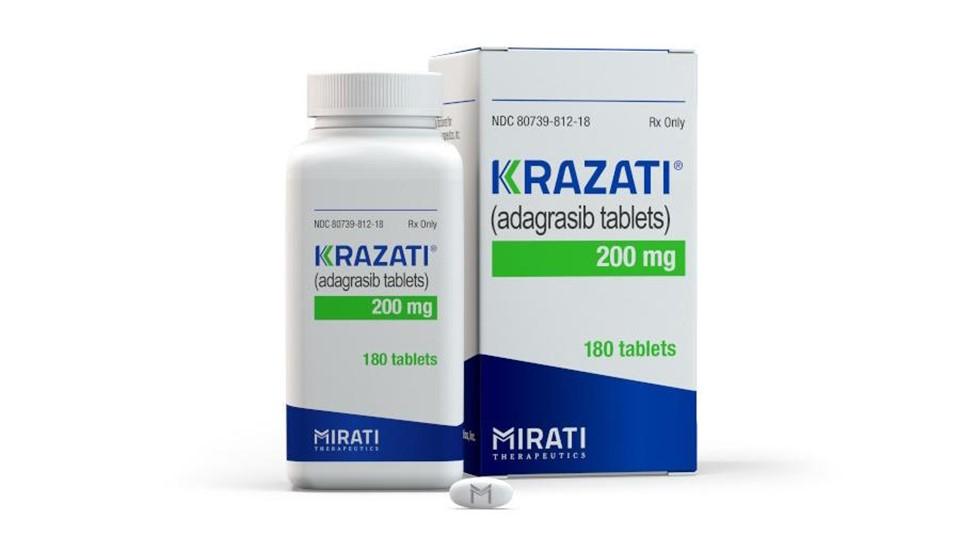EMA panel rejects Mirati’s KRAS drug Krazati

Mirati Therapeutics’ hopes of an EU approval for its KRAS inhibitor Krazati in the EU have been thrown into disarray after the EMA’s human medicines committee rejected the drug as a lung cancer treatment.
The Committee for Medicinal Products for Human Use (CHMP) said it recommended refusing Mirati’s marketing application for Krazati (adagrasib) as a treatment for non-small cell lung cancer (NSCLC) with KRAS G12C mutations, as “comprehensive data for this medicine [was] not yet available.”
Mirati – which already has FDA approval for Krazati for this indication – said it disagrees with the CHMP’s negative opinion and will request a formal re-examination of the decision.
The main issue for the company is that Amgen’s rival KRAS inhibitor Lumykras (sotorasib) has already been given conditional approval in the EU, so the CHMP considers that Mirati was unable to show that Krazati fulfils an “unmet medical need.”
It wants to wait until data from the confirmatory KRYSTAL-12 trial of the drug is available, which isn’t expected to happen until next year. Mirati disagrees, saying that Krazati already has evidence of “a differentiated clinical profile”, including its clinical efficacy, potential to cross into the central nervous system, and compatibility with other medicines.
Unless the decision is reversed, it will make it increasingly hard for Mirati to position Krazati in the market as an alternative to Amgen's drug, which became the first in the KRAS inhibitor class to be approved for marketing when the FDA cleared it as Lumakras in May 2021.
Lumykras was approved in the EU in January 2022, helping sales of the drug to reach $285 million last year, with another 19% increase to $74 million in the first three months of 2023. In comparison, Krazati brought in just over $6 million in the first quarter of this year.
As a class, the KRAS inhibitors are, however, showing worrying signs that growth momentum is tailing off, with Lumakras’ first quarter sales just $3 million ahead of the last three months of 2022. At launch, there was much talk of $1 billion-plus sales potential, with speculation rising that the potential market isn’t as big as once thought.
Other CHMP decisions
The CHMP’s monthly meeting included a number of other decisions, including positive opinions for the following selected medicines:
Pfizer’s respiratory syncytial virus vaccine Abrysvo was backed for both the protection of older adults and as a maternal shot to protect newborns and infants. GSK’s rival vaccine Arexvy was approved in the EU last month for older adults, but is no longer being developed for use in expectant mothers;
Menarini subsidiary Stemline Therapeutics’ oral selective oestrogen receptor degrader (SERD) Orserdu (elacestrant) was backed for the treatment of postmenopausal women and men with locally advanced or metastatic breast cancer with ESR1 mutation, an indication approved by the FDA in January;
Merck Sharp and Dohme’s P2X3 receptor antagonist Lyfnua (gefapixant) was backed for unexplained chronic cough, which was turned down by the FDA last year, but has also been approved in Japan and Switzerland;
Janssen Pharma’s subcutaneous GPRC5xCD3 bispecific antibody Talvey (talquetamab) was backed for relapsed and refractory multiple myeloma after at least three prior therapies – which is still waiting for a verdict in the US;
Novartis’ PD-1 inhibitor Tevimbra (tislelizumab) was backed as a second-line treatment for oesophageal squamous cell carcinoma, setting up the first possible approval for the drug outside China;
ViiV Healthcare’s long-acting oral/injectable combination Apretude (cabotegravir) was backed for pre-exposure prophylaxis in people at risk of contracting HIV; and
Jazz Pharmaceuticals’ Enrylaze (crisantaspase) was backed for acute lymphoblastic leukaemia (ALL) and lymphoblastic lymphoma (LBL).













